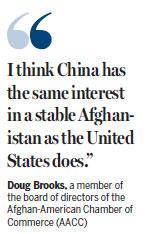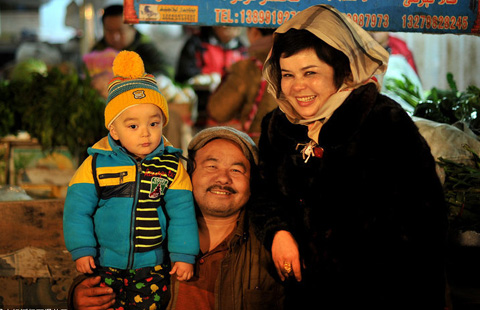China plays mediator in Afghanistan
Updated: 2015-01-15 12:29
By Chen Weihua in Washington(China Daily USA)
|
||||||||
China on Wednesday announced that it has been mediating between the Afghan government and the Taliban as the United States withdraws troops to end its 13-year war there, the longest in US history.

"As a friendly neighbor of Afghanistan, China values its relationship with Afghanistan and hopes to see Afghanistan achieve long-lasting peace, stability and development at an early date," Foreign Ministry spokesman Hong Lei told a daily briefing in Beijing.
He said China supports the Afghan-led and Afghan-owned peace and reconciliation process and stands ready to play a constructive role.
The United States began to withdraw its troops from Afghanistan last month to end its 13-year war there, the longest in US history.
Reports show that 10,800 US military personnel were in Afghanistan at the turn of the New Year, and half those troops are expected to remain until the total withdrawal by the end of 2016.
While the war has killed several thousand American soldiers, many times more Afghan military elements and civilians have been killed.
As the US role declines, China has become more active diplomatically trying to stabilize the war-torn nation, which shares a short mountainous border with China.
China had for the first time hosted the fourth Foreign Ministerial Conference of the Istanbul Process on Afghanistan in Beijing last October to facilitate peace and stability there, with the presence of new Afghan President Ashraf Ghani. Ghani expressed his hope for a greater role by China in his country's peace, stability and development.
In November 2011, China, Russia, Afghanistan and several central Asian countries reached an agreement in Turkey known as the Istanbul Process, with the goal of a secure and stable Afghanistan. In addition to Afghanistan, the 14 members include countries China, India, Iran, Kazakhstan, Pakistan, Russia and Turkey, while 28 supporting parties include the US, the UK, the United Nations and the Shanghai Cooperation Organization.
Doug Brooks, a member of the board of directors of the Afghan-American Chamber of Commerce (AACC), told China Daily on Wednesday that he thought what China did in Afghanistan was very good.
But he pointed out that it was still limited, adding that "I think the Americans miss the point that the Chinese are as risk averse as anyone about having their personnel in a very dangerous environment."
A Gallup poll released on Wednesday finds that many Afghans expect life to be worse after US troop withdraw.
"I think China has the same interest in a stable Afghanistan as the United States does," Brooks said.
He said he does see a convergence of American and Chinese interest in Afghanistan. "Afghanistan could be a wonderful example where they can come together," he said.
Under the Silk Road Economic Belt and Maritime Silk Road unveiled by Chinese President Xi Jinping in 2013, China has already poured a huge amount of money into the Central and South Asia regions to develop infrastructure.
Chinese Ambassador to the US Cui Tiankai said at the US Institute of Peace last year that people might draw useful lessons from the ancient Silk Road. "Maybe Silk Road can pave the way that guns and tanks cannot," he said.
Douglas Paal, vice-president for studies at the Carnegie Endowment for International Peace, told China Daily recently that the Silk Road makes a lot of sense and the Asia Infrastructure Investment Bank (AIIB) proposed by China has a lot of potential.
"It's good for the Central Asians. They need trade routes, and they need places to employ their young people,' he said, adding that the US should work with China on the Silk Road.
China and the US have started to cooperate on Afghanistan, something that senior US and Chinese officials have spoken positive about.
US Secretary of State John Kerry told visiting Chinese State Councilor Yang Jiechi in Boston in October that the US sees Afghanistan as a positive part of the US-China relationship, and the two countries share an interest to see Afghanistan become an increasingly stable and prosperous country.
Last year for the third year in a row, China and the US joined hands in training early-career Kabul diplomats in Beijing and Washington.
China has promised to strengthen its support for reconstruction in Afghanistan, by pledging 2 billion yuan ($327) in assistance from 2014 to 2017. It also plans to train 3,000 professionals in various fields for Afghanistan.

 Two Chinese-American reps sworn in
Two Chinese-American reps sworn in
 Mental illness no handicap to Nanjing artists
Mental illness no handicap to Nanjing artists
 Kashgar's diversity of cultures
Kashgar's diversity of cultures
 Best wedding snaps in 2014
Best wedding snaps in 2014
 Fancy sportscars premiere at Detroit auto show
Fancy sportscars premiere at Detroit auto show
 Looking hot in the cold
Looking hot in the cold
 Beijing sees first winter snow amid heavy smog
Beijing sees first winter snow amid heavy smog
 Elderly swimmers see health benefits in freezing water
Elderly swimmers see health benefits in freezing water
Most Viewed
Editor's Picks

|

|

|

|

|

|
Today's Top News
US official lauds fight by China vs. graft
China plays mediator in Afghanistan
Chinese tourists boost travel to Los Angeles
Pursuing General Tso and his chicken
Videos show attack on USC student
Two Chinese-American reps sworn in
E-commerce firm Wowo to seek $40m in US IPO
Lunar New Year to boost gold sales
US Weekly

|

|







